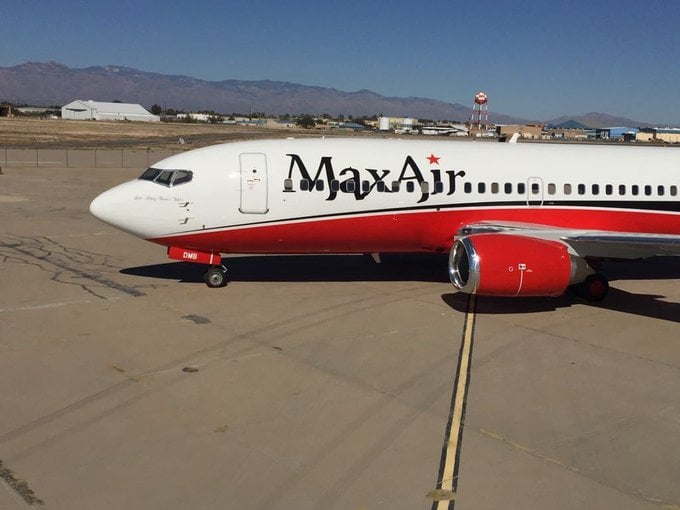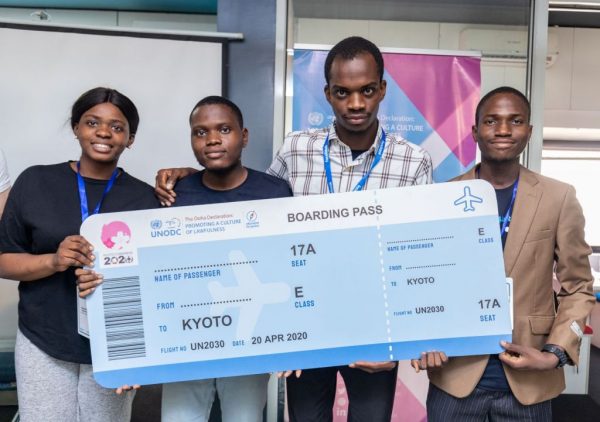A report published by the Accident Investigation Bureau (AIB) has shown that Max Air may have acted in contravention of civil aviation regulations by flying an aeroplane without a serviceable cockpit flight recorder.
The report, although preliminary, was published by the bureau on Tuesday.
In September 2019, a Max Air flight conveying pilgrims from Saudi Arabia drifted slightly right of centerline during landing and while making the correction to bring the aircraft to the centerline it over banked.
“As a result, the number one engine impacted was dragged along the runway surface, causing damage to the engine cowl and thrust reverser (T/R) cowls,” the report quoted the pilot flying the aeroplane to have said.
Advertisement
The airline had blamed weather conditions and lack of runway lighting for the incident.
A cockpit flight recorder (CVR) is a device that uses a combination of microphones and other audio and digital inputs to collect and record the aural environment of the cockpit and communications to, from and between the pilots.
“The flight data recorder (FDR) and cockpit voice recorder (CVR) were retrieved and downloaded at the flight safety laboratory of Accident Investigation Bureau (AIB) Nigeria.
Advertisement
“There were no relevant data recorded on the CVR as it was not serviceable as at the time the aircraft was dispatched. Data pertinent to the incident flight were captured on the FDR which include: localizer deviation, glideslope deviation, pressure altitude, radio height and vertical acceleration.”
Stating its initial findings of the incident, AIB said: “The crew were certified and qualified to conduct the flight, one runway edge light was damaged, bird strike at the edge of the radome was observed, the cockpit voice recorder (CVR) was unserviceable and Max Air does not have an approved safety management system as required by the Nigerian Civil Aviation Regulations”.
NCAA regulations
Checks by TheCable showed that flight operation rules by the Nigerian Civil Aviation Authority states that “no person may operate an aeroplane unless it is equipped with a cockpit voice recorder”.
Advertisement
In a notice to airlines dated July 20, 2019, the NCAA warned flight crew against the habit of overwriting cockpit voice recorder information.
This, it said, contravened part 7.8.1.3—(b) of civil aviation regulations which states that “to preserve flight recorder records, flight recorders shall be deactivated upon completion of flight time following an accident or incident. The flight recorders shall not be reactivated before their disposition as determined in accordance with the accident/incident regulations of Nigeria”.
Part 8.14.10.3-(a) also states that “the operator/owner of the aircraft, or in the case where it is leased, the lessee, shall ensure, to the extent possible, in the event the aircraft becomes involved in an accident or incident, the preservation of all related flight recorder records and, if necessary, the associated flight recorders, and their retention in safe custody pending their disposition as determined by the Accident Investigation Bureau.
In addition, part 8.5.1.24 stipulates that “the PIC shall ensure that whenever an aircraft has flight recorders installed, those recorders are operationally checked and operated continuously from the instant—
Advertisement
- For a flight data recorder, the aircraft begins its takeoff roll until it has completed the landing roll, and
- For a cockpit voice recorder, the initiation of the pre-start checklist until the end of the securing aircraft checklist.
- The PIC may not permit a flight data recorder or cockpit voice recorder to be disabled, switched off or erased during flight, unless necessary to preserve the data for an accident or incident investigation.
- In event of an accident or incident, the PIC shall act to preserve the recorded data for subsequent investigation upon completion of flight.
Add a comment







